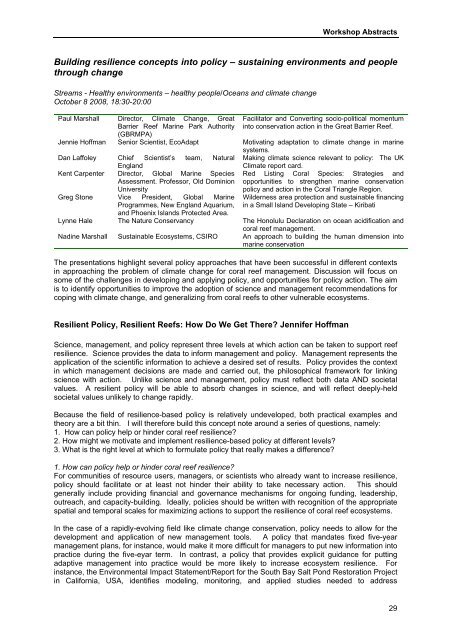Obura2009-IUCN Congress report - Resilience sessions
Obura2009-IUCN Congress report - Resilience sessions.pdf
Obura2009-IUCN Congress report - Resilience sessions.pdf
You also want an ePaper? Increase the reach of your titles
YUMPU automatically turns print PDFs into web optimized ePapers that Google loves.
Workshop Abstracts<br />
Building resilience concepts into policy – sustaining environments and people<br />
through change<br />
Streams - Healthy environments – healthy people/Oceans and climate change<br />
October 8 2008, 18:30-20:00<br />
Paul Marshall Director, Climate Change, Great<br />
Barrier Reef Marine Park Authority<br />
(GBRMPA)<br />
Facilitator and Converting socio-political momentum<br />
into conservation action in the Great Barrier Reef.<br />
Jennie Hoffman Senior Scientist, EcoAdapt Motivating adaptation to climate change in marine<br />
systems.<br />
Dan Laffoley Chief Scientist’s team, Natural Making climate science relevant to policy: The UK<br />
England<br />
Climate <strong>report</strong> card.<br />
Kent Carpenter Director, Global Marine Species Red Listing Coral Species: Strategies and<br />
Assessment. Professor, Old Dominion<br />
University<br />
opportunities to strengthen marine conservation<br />
policy and action in the Coral Triangle Region.<br />
Greg Stone Vice President, Global Marine<br />
Programmes, New England Aquarium,<br />
and Phoenix Islands Protected Area.<br />
Wilderness area protection and sustainable financing<br />
in a Small Island Developing State – Kiribati<br />
Lynne Hale The Nature Conservancy The Honolulu Declaration on ocean acidification and<br />
coral reef management.<br />
Nadine Marshall Sustainable Ecosystems, CSIRO An approach to building the human dimension into<br />
marine conservation<br />
The presentations highlight several policy approaches that have been successful in different contexts<br />
in approaching the problem of climate change for coral reef management. Discussion will focus on<br />
some of the challenges in developing and applying policy, and opportunities for policy action. The aim<br />
is to identify opportunities to improve the adoption of science and management recommendations for<br />
coping with climate change, and generalizing from coral reefs to other vulnerable ecosystems.<br />
Resilient Policy, Resilient Reefs: How Do We Get There? Jennifer Hoffman<br />
Science, management, and policy represent three levels at which action can be taken to support reef<br />
resilience. Science provides the data to inform management and policy. Management represents the<br />
application of the scientific information to achieve a desired set of results. Policy provides the context<br />
in which management decisions are made and carried out, the philosophical framework for linking<br />
science with action. Unlike science and management, policy must reflect both data AND societal<br />
values. A resilient policy will be able to absorb changes in science, and will reflect deeply-held<br />
societal values unlikely to change rapidly.<br />
Because the field of resilience-based policy is relatively undeveloped, both practical examples and<br />
theory are a bit thin. I will therefore build this concept note around a series of questions, namely:<br />
1. How can policy help or hinder coral reef resilience?<br />
2. How might we motivate and implement resilience-based policy at different levels?<br />
3. What is the right level at which to formulate policy that really makes a difference?<br />
1. How can policy help or hinder coral reef resilience?<br />
For communities of resource users, managers, or scientists who already want to increase resilience,<br />
policy should facilitate or at least not hinder their ability to take necessary action. This should<br />
generally include providing financial and governance mechanisms for ongoing funding, leadership,<br />
outreach, and capacity-building. Ideally, policies should be written with recognition of the appropriate<br />
spatial and temporal scales for maximizing actions to support the resilience of coral reef ecosystems.<br />
In the case of a rapidly-evolving field like climate change conservation, policy needs to allow for the<br />
development and application of new management tools. A policy that mandates fixed five-year<br />
management plans, for instance, would make it more difficult for managers to put new information into<br />
practice during the five-eyar term. In contrast, a policy that provides explicit guidance for putting<br />
adaptive management into practice would be more likely to increase ecosystem resilience. For<br />
instance, the Environmental Impact Statement/Report for the South Bay Salt Pond Restoration Project<br />
in California, USA, identifies modeling, monitoring, and applied studies needed to address<br />
29


















